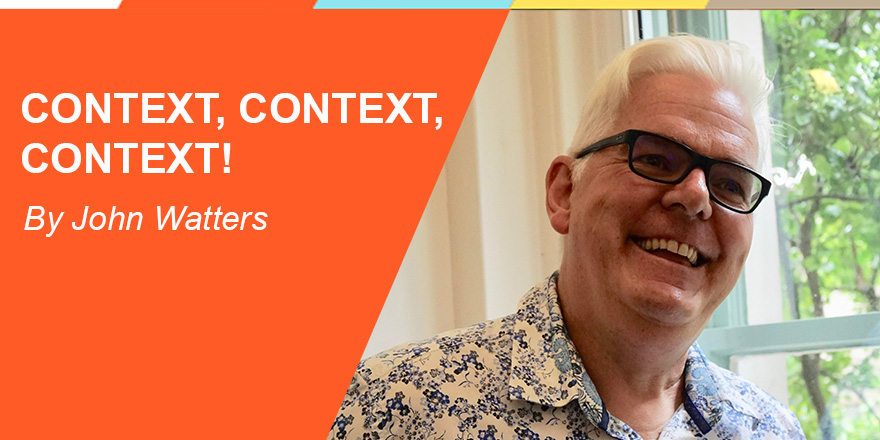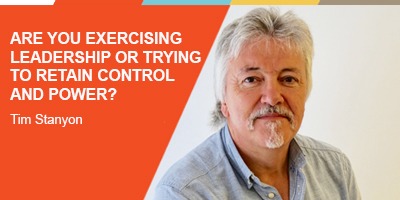

One frustrating aspect of this whole crisis has been the apparent slowness in getting things into action. For example, potential suppliers of PPE and ventilators and small labs able to offer testing all remain just that, potential! All of them report how tardy and bureaucratic the response has been from the centre when what they needed was agility and responsiveness. And there-in lies one major problem. The UK Government seem intent on running everything from the centre where what is needed is a flexible and decentralised approach that empowers the many to do what they can see is needed at their local level, from their vantage point closer to the front-line.
It seems the UK Government are locked into a paradigm of command and control no doubt explicitly in the name of “efficiency and co-ordination” because they fear chaos and an out-of-control free for all if they relinquish control. Does that sound like any leaders you know or have worked for or perhaps even have been?
When faced with the need for urgent mobilisation what is needed “from the centre” is a clear statement of need, trust in others to deliver on that need and the provision of necessary resources (including using their position in the system to remove blockages if needed) to enable those closer to the action to be able to deliver. That way the many can liberate local resources, energy and commitment and working in collaboration where needed, with open lines of communication, they can unleash a wave of delivery actions. Enlightened leaders know the difference between exercising real leadership by enabling others to perform and holding onto power (or the illusion of power) by trying to control everything themselves or within a tightknit group “at the centre”. Enlightened leaders recognise the need to be in service of others to liberate their potential and to create environments where others can thrive and contribute. Enlightened leaders exercise trust not control.
Of course, collaboration is necessary but collaboration is not command and control. It is a free two-way flow of information and resources to areas in the system that need those to succeed. Enlightened leaders know how to collaborate effectively across boundaries.
Had the UK Government established very early on clear guidance on WHAT is needed, built partnerships and collaborated with the wider system through local government, charities, the private sector suppliers and technical laboratories and let them engage with the HOW, I suggest many of the delays which have arisen between the “centre” and the “rest” could have been greatly reduced if not eliminated. In doing so the UK Government would have needed to show trust in others, create psychological safety that would enable doctors, nurses, care workers etc to speak up about problems and shortages without fear of reprisal which would have meant that key signals of problems would have been heard clearly and acted upon in a timely fashion. Enlightened leaders know that enabling a system where weak signals from the system’s edges can be amplified (through trust and no-blame cultures) allows a rapid response to customer needs which builds confidence and loyalty in those customers as they see their needs heard and addressed.
Leaders who cling to power at their centre and do not create the conditions where others can grow and thrive, are limiting their organisation’s ability to be relevant and effective. Enlightened leaders know that success is built on trust, empowerment, delegation, collaboration and a willingness to let go of “power” and status for themselves and be in service of the systems they lead.
We at @FCreconsider have been developing leaders with these qualities for many years. We are always learning WITH our clients what it takes to a truly effective leader in a VUCA world. If you want to find out more about how we do this and to discuss how we can work with you to build future-relevant leaders in the turbulent world now upon us please contact [email protected] or [email protected].
Future Considerations Ltd
29 Adonis Street, Acropolis
Subdivision, Libis,
Quezon City,
Philippines 1110
Jon’s early career designing applications led to him becoming IT director for a market-leading multinational. His systemic perspective, allied with a background in psychology and subsequent leadership experience inside major organisations was followed by intensive learning in personal development, values systems and multiple intelligences. Brought together, these create a transformational perspective for understanding and developing organisations as living systems. Jon is a master trainer in Spiral Dynamics, a founder director of the UK chapter of Conscious Capitalism and a certified Spiritual Intelligence coach. He is the author of several books and articles and is developer of Relational Being, a visionary whole systems approach to evidence-based spirituality, complexity science, human emergence, societal change and conscious business. This breadth of experience and deep understanding informs his work as a consultant, coach, trainer and facilitator.